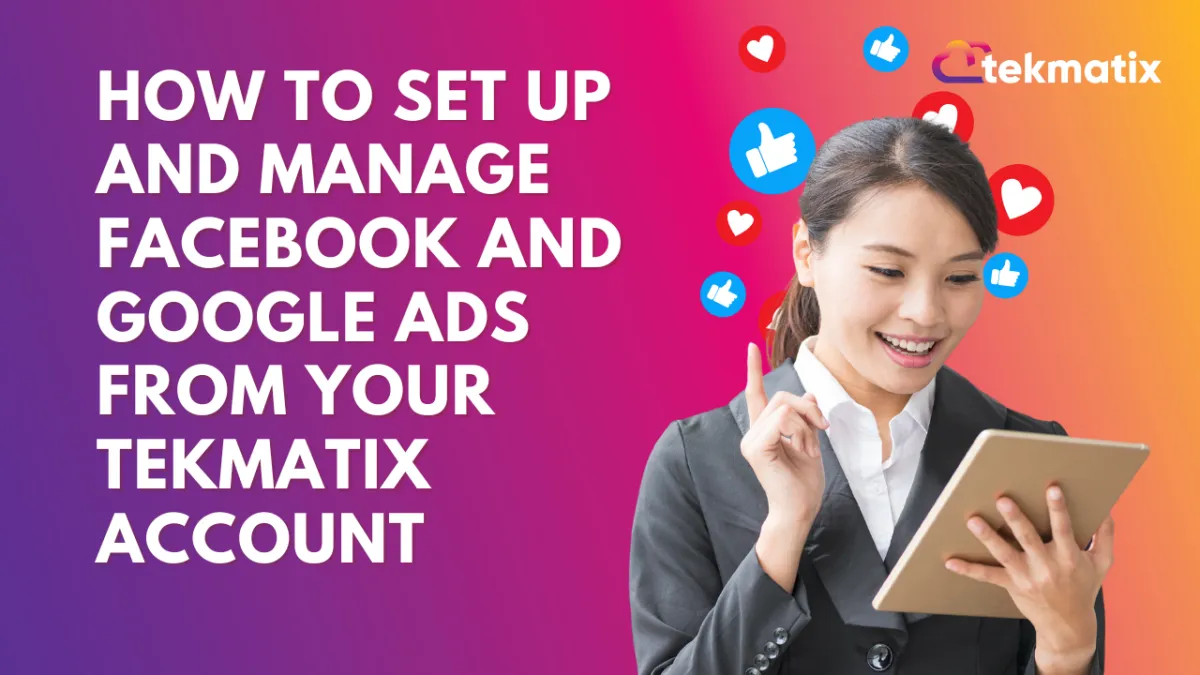TekMatix Blog & Help Articles
Use the search bar below to look for help articles you need.

Set Up and Manage Facebook and Google Ads from your Tekmatix Account - Ads Manager in Tekmatix
Set Up and Manage Facebook and Google Ads from your Tekmatix Account - Ads Manager in Tekmatix
Setting Up Facebook Ads Manager
Facebook Lead Ads Automation
Integrating Facebook lead ads with a CRM is a game-changer for businesses looking to streamline lead management and automate engagement. By setting up ads that target the right audience and connecting them to a CRM, you can ensure seamless follow-ups, lead nurturing, and improved conversion rates. This guide walks you through the essential steps of creating a Facebook lead ad, integrating it with your CRM, and leveraging automation for maximum efficiency.
Setting Up Facebook Ads Manager
Campaign Creation
Navigate to the Facebook Ads Manager, select your ad account, and click the "+ Create" button. Choose "Leads" as your objective, and select Continue to access the campaign structure setup.

You can use the recommended template already prebuilt or Start Manually to have more control over the ad creation.

Campaign Settings
Name your campaign appropriately, you can categorize your ads for specificity. Also, ensure A/B testing and campaign budget optimization are turned off for simplicity. Make sure all your edits are saved then click on Next.

Ad Set Configuration
At the ad set level, name your set, and choose "Instant Forms" as your lead method.

Select the correct Facebook page to run ads and set your budget and target audience.

For local businesses, focusing on your service area is crucial.

Ad Creation
Remember to Name your ad appropriately.

Choose between carousel or single image/video formats, and upload your media. You can also create a form from scratch. Craft compelling primary text, headlines, and descriptions to engage your target audience. Select an appropriate call to action, focusing on what the audience is seeking, such as a quote or offer.

Connect CRM To Facebook Ads
Select the “Set up” button to connect Facebook Ads to your CRM.

In the dropdown search and select your CRM.

You will be prompted to connect it through Zapier. Fill out the necessary steps and publish to complete this process.

Connecting Your Ad to the CRM
After setting up your Facebook lead ad, the next step is to integrate it with the CRM to automate the follow-up process and lead management.
CRM Account Connection
Log into your CRM account, navigate to settings, and find the integrations section. Connect your CRM account to your Facebook page to import leads automatically.

Field Mapping
Within the Integrations in the Facebook forms field mapping tab map form fields correctly, ensuring data is imported accurately.

Automation Setup
Create automation workflows within the CRM to handle new leads efficiently. This includes tagging contacts, creating opportunities, and sending notifications to both the client and the lead.
Once a lead form is submitted, the CRM should instantly tag the contact, create an opportunity, and send notifications.

Engagement
Automated emails and text messages should be sent to the lead, asking for more information or confirming their interest. Then publish and save the workflow.

Combining the power of Facebook lead ads with CRM automation opens up endless possibilities for efficient lead management and timely engagement. By following these steps, you can simplify your workflows, focus on nurturing quality leads, and grow your business with minimal manual intervention. With accurate mapping and smart automation, your CRM becomes a tool that drives results and keeps your audience engaged.
Important Notes
Based on the lead's response, the CRM can facilitate appointment scheduling directly through automated interactions.
If there's no initial response, the CRM should initiate a follow-up sequence to re-engage the lead.
How to Create a New Google Search Ad Campaign
The Ad Manager tool streamlines the process of creating and managing Google Ads campaigns directly from your CRM. This guide will walk you through the steps to create a Google Ads campaign, ensuring you can efficiently define your ad content, set a budget, and target the right audience. Let's begin.
Campaign Setup
From the Ad Manager home screen, click on the 'Create Campaign' button. A pop-up will appear allowing you to select Google as the platform to publish your campaign.

Once you've selected Google, click 'Next' to choose whether to start from scratch or use Ad Manager templates.

Ad content creation follows a streamlined three-tier structure:
Campaign Level
Ad Group Level
Ad Level
Each level includes a dedicated configuration process, allowing for more organized and targeted ad management.
Campaign Level Setup
Name
Begin by entering a unique and descriptive name for your campaign to help identify it easily.

Budget
The campaign manager can set a daily budget for the campaign. This functions as a subscription and will be charged to the card linked to the connected Google Ads account.
Key features include:
A clear breakdown of daily spend, along with the campaign's start and end dates.
The ability to adjust the budget amount at any time by editing the campaign.
📌Note: The currency displayed will match the currency configured in your connected Google Ads account, and the campaign's start and end dates will follow the time zone you are in at the time of campaign creation.

Bid Strategy
Choose your preferred bid strategy. The Maximize Clicks bid strategy aims to generate as many clicks as possible within your budget. For greater control over your spend, you can enable a maximum cost-per-click (CPC) limit. This optional setting allows you to cap the highest amount you're willing to pay for a single click.
Use the toggle to enable or disable the max CPC limit based on your budget and campaign goals.

Networks
In the Networks section, you can choose to enable the search and display network options. These settings allow you to choose whether your ads will appear near Google Search results or when a customer visits a site.

Geographic Location
Campaigns can be tailored to target specific locations or exclude certain areas within a country or state.
You can define geographic targeting in two ways:
By Location: Search and select a country, city, place name, address, or coordinates.
By Radius: Specify a radius around a chosen address to define the audience reach.
Use the radio buttons to select your preferred targeting method, then search and select the desired location.
📌Note: Google Ads does not support the ability to include or exclude locations by radius. When using radius-based targeting, you can adjust the radius to expand or narrow your audience reach.

Language
Enter the languages spoken by the users you wish to target. You can search for and select multiple languages to include in a single campaign.

Gender and Age Targeting
Select the genders and age ranges your content is most suitable for to ensure precise audience targeting. Selecting the “Unknown” option allows you to reach users without a specified age/gender.

Additional Assets
In the Additional Assets section, you can configure Business Logos, Call Extensions, and Sitelinks to ensure consistent branding and messaging. These assets will be automatically applied across all associated Ad Groups and Ads within the campaign, streamlining setup and eliminating the need for repetitive configuration.

Ad Group Level Setup
Ad Group Name
Enter a unique name to identify the group by easily.

Website URL
Enter a base website URL. This URL will generate keyword suggestions based on site content and apply as the destination URL for all ads within the group.

Keywords
You can either manually enter keywords or select from auto-suggestions based on your website or campaign content.
Match Types Supported:
Broad Match
Phrase Match
Exact Match
You may enter up to 40 positive keywords and 40 negative keywords to fine-tune your audience targeting and ad relevance. Add another phrase or word in the keyword box to create additional keywords, or click on the cross icon on the selected keyword to delete it.
📌Note: Each word or phrase keyword can be up to 80 characters.

Ad Level Setup
In this step, you will define the content for up to three ads within your ad group.
Website URL
Enter the exact website URL where users will land when they click your ad. This is a required field and must be entered manually.
Optionally, enter a display path. These optional fields allow you to add up to two path segments (up to 15 characters each) to your URL. Display paths create a clean, user-friendly URL that appears in your ad but does not need to match the actual website structure.
📌Note: All ads within the same ad group must share the same base URL, but can have different display paths to customize the appearance of the URL in each ad.

Headline
You can add up to 15 headlines, each with a 30-character limit. Your ad's headline can be split into three parts, separated by the “|” character. Under Headline 1, enter the first part of your headline. If your full headline exceeds 30 characters, you can continue it using Headline 2 and Headline 3, each allowing up to 30 additional characters.
Use the "Add New Headline" button to dynamically add more headlines, up to the 15-headline limit.
📌Note: A minimum of 3 headlines is required to proceed.

Description
You can add up to 4 descriptions, each with a 90-character limit. Start by entering your ad copy in Description 1. If your message exceeds 90 characters, you can continue it in Description 2, which also allows up to 90 characters. Use the "Add New Description" button to add more descriptions, up to the 4-description limit.
📌Note: A minimum of 2 descriptions is required to proceed.

Review and Publish
Before publishing your campaign, review all the details, including ad content, budget, and audience settings. If any adjustments need to be made, click the pencil icon. Once you're satisfied with the setup, click 'Publish' to launch your campaign. The payment will then be processed through the connected Google Ads account.

By following these steps, you can efficiently create a Google Ads campaign through the Ad Manager tool. This simplifies campaign setup and makes it easier to reach the right audience and track performance across platforms.
✍️Important Note
When creating an ad campaign, please ensure strict compliance with Google Ads policies to avoid ad disapprovals or rejections. For detailed guidelines, refer to the official Google Ads policies linked below:
Copyright © 2026 TekMatix. All rights reserved | [email protected]

